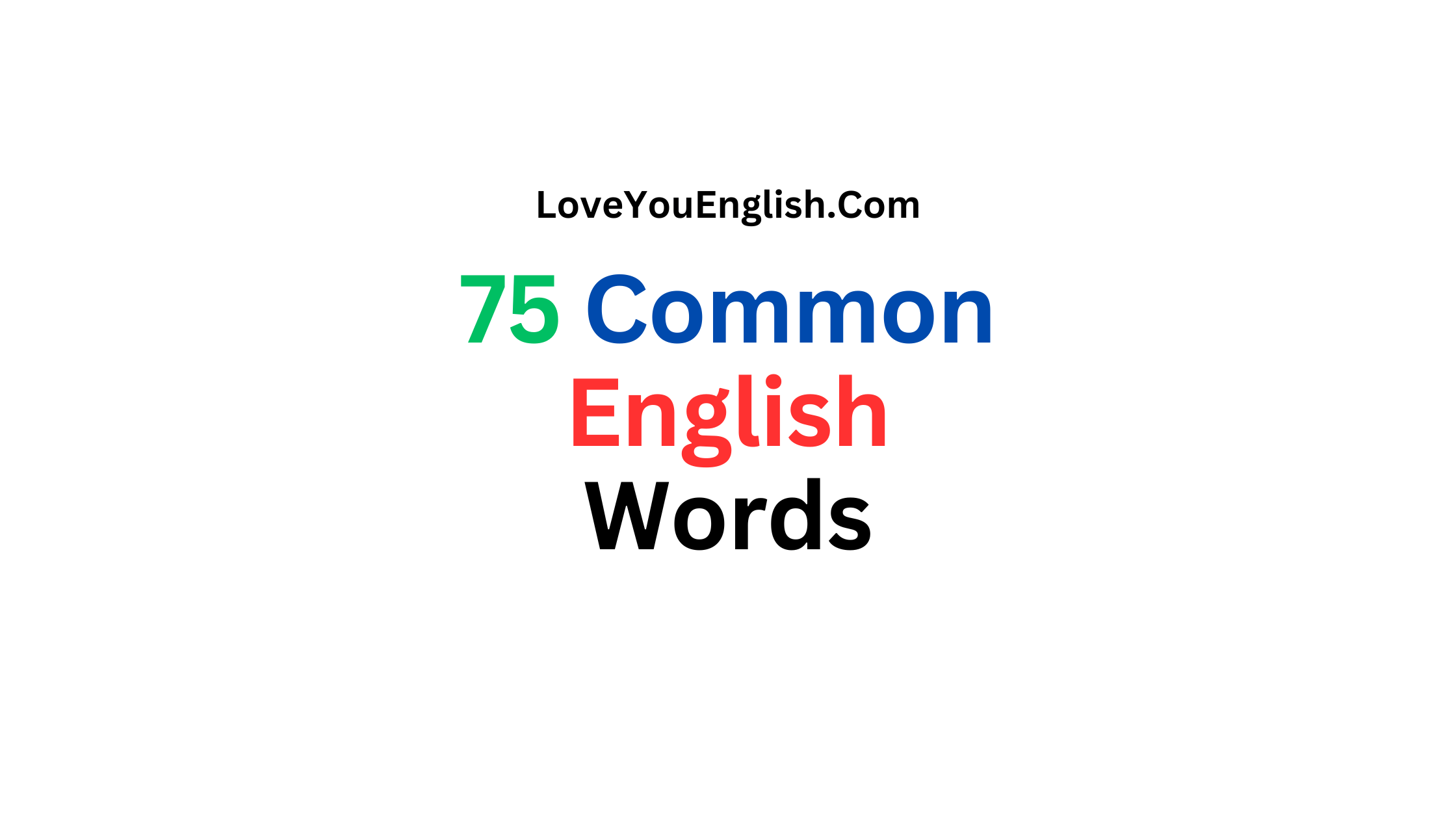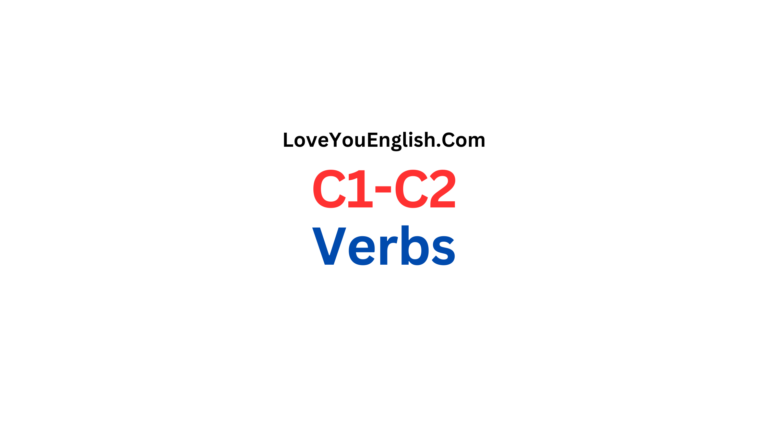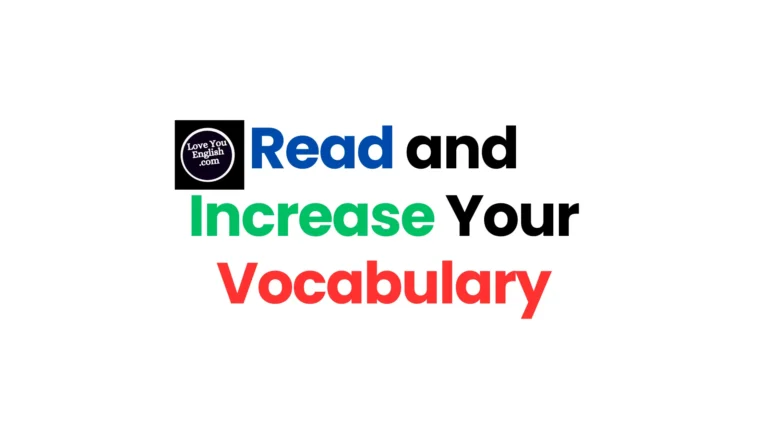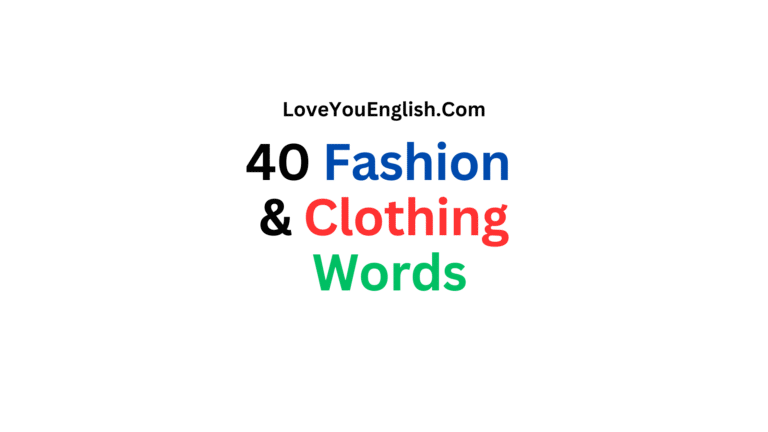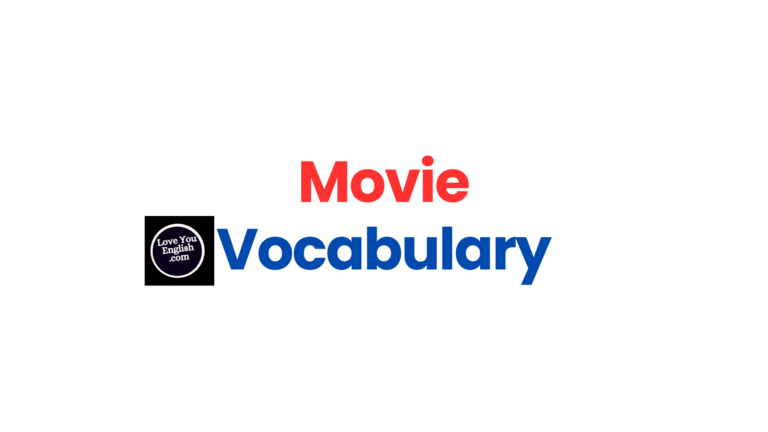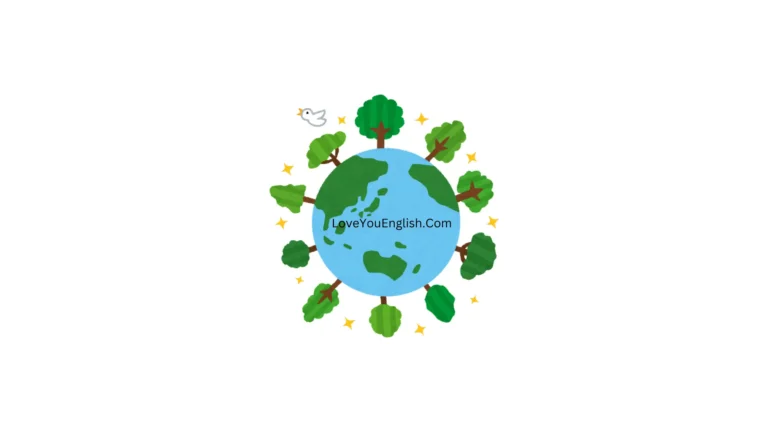75 Common English Words Used in Daily Life
75 Common English Words Used in Daily Life
Learning English can be fun and rewarding, especially when you start using common words in your daily life.
These words help you communicate effectively and make conversations easier.
Whether you are a beginner or looking to improve your English skills, knowing these common words is a great place to start.
In this post, we will explore 75 everyday English words that you can use in different situations.
Let’s dive in!
Song
Meaning: A musical composition with lyrics.
Example: “My favorite song is on the radio.”
Usage: Use “song” for musical tracks.
Dance
Meaning: Moving to music rhythmically.
Example: “We danced at the party.”
Usage: Use “dance” for rhythmic movements to music.
Exercise
Meaning: Physical activity to stay healthy.
Example: “I go jogging for exercise.”
Usage: Use “exercise” for physical fitness activities.
Holiday
Meaning: A special day for celebration or rest.
Example: “We went on a holiday to the mountains.”
Usage: Use “holiday” for special days and vacations.
Friend
Meaning: Someone you like and trust.
Example: “She’s been my friend for years.”
Usage: Use “friend” for people you care about.
Visit
Meaning: To go see someone.
Example: “I’m going to visit my grandparents this weekend.”
Usage: Use “visit” for going to see people or places.
News
Meaning: Information about current events.
Example: “I read the news every morning.”
Usage: Use “news” for updates and reports.
Weather
Meaning: The state of the atmosphere.
Example: “The weather is sunny today.”
Usage: Use “weather” for atmospheric conditions.
Season
Meaning: A period of the year with specific weather.
Example: “Winter is my favorite season.”
Usage: Use “season” for weather periods throughout the year.
Shopping
Meaning: Buying goods and services.
Example: “I went shopping for clothes yesterday.”
Usage: Use “shopping” for buying items.
Party
Meaning: A social gathering for enjoyment.
Example: “We had a party for her birthday.”
Usage: Use “party” for celebrations and gatherings.
Event
Meaning: An occurrence or happening.
Example: “The concert was a great event.”
Usage: Use “event” for special occurrences.
Gift
Meaning: Something given to someone.
Example: “I bought a gift for her birthday.”
Usage: Use “gift” for presents and offerings.
Card
Meaning: A small piece of paper for messages.
Example: “I wrote a thank you card for the gift.”
Usage: Use “card” for written notes and messages.
Photo
Meaning: An image captured by a camera.
Example: “We took a photo at the beach.”
Usage: Use “photo” for pictures.
Picture
Meaning: An image or drawing.
Example: “She drew a picture of her cat.”
Usage: Use “picture” for visual representations.
Friendship
Meaning: A relationship between friends.
Example: “Friendship is important in life.”
Usage: Use “friendship” for relationships with friends.
Travel
Meaning: Moving from one place to another.
Example: “Travel can be a great adventure.”
Usage: Use “travel” for journeys and trips.
Adventure
Meaning: An exciting or unusual experience.
Example: “We went on an adventure to the mountains.”
Usage: Use “adventure” for exciting experiences.
Museum
Meaning: A place for displaying historical or artistic items.
Example: “We visited the museum on Saturday.”
Usage: Use “museum” for cultural and historical exhibits.
Gallery
Meaning: A place for displaying art.
Example: “The art gallery had beautiful paintings.”
Usage: Use “gallery” for art exhibitions.
Zoo
Meaning: A place where animals are kept for public viewing.
Example: “We took the kids to the zoo.”
Usage: Use “zoo” for animal exhibitions.
Park
Meaning: An outdoor area for recreation.
Example: “Let’s go for a walk in the park.”
Usage: Use “park” for recreational areas.
Playground
Meaning: An outdoor area with equipment for children.
Example: “The kids had fun at the playground.”
Usage: Use “playground” for children’s play areas.
Gym
Meaning: A place for physical exercise.
Example: “I go to the gym to stay fit.”
Usage: Use “gym” for exercise facilities.
Coach
Meaning: A person who trains and guides others.
Example: “The coach helped us improve our skills.”
Usage: Use “coach” for sports or personal training.
Trainer
Meaning: A person who teaches or instructs.
Example: “I hired a trainer to help with my fitness goals.”
Usage: Use “trainer” for professional instructors.
Workshop
Meaning: A place for working on projects.
Example: “We held a workshop on creative writing.”
Usage: Use “workshop” for hands-on learning events.
Class
Meaning: A group of students learning together.
Example: “I’m taking a cooking class this semester.”
Usage: Use “class” for educational sessions.
Lesson
Meaning: A unit of teaching or learning.
Example: “Today’s lesson is about grammar.”
Usage: Use “lesson” for educational topics.
Homework
Meaning: Tasks assigned by teachers to be done outside of class.
Example: “I need to finish my homework before dinner.”
Usage: Use “homework” for school assignments.
Project
Meaning: A planned task or assignment.
Example: “Our project is due next week.”
Usage: Use “project” for group or individual work.
You may want to read more:
- Advanced Adjectives for Describing People
- 5 English slang terms you need to know in 2024
- How to Expand Your English Vocabulary Fast
- 29 Slang Words You Need to Know
- How to Build English Vocabulary: 10 Tips for Success
Test
Meaning: An examination of knowledge or skills.
Example: “I have a math test tomorrow.”
Usage: Use “test” for assessments and exams.
Exam
Meaning: A formal test of knowledge.
Example: “The final exam is very important.”
Usage: Use “exam” for major evaluations.
Grade
Meaning: A score or mark given for work.
Example: “I got a good grade on my essay.”
Usage: Use “grade” for academic evaluations.
Subject
Meaning: A topic studied in school.
Example: “Math is my favorite subject.”
Usage: Use “subject” for different fields of study.
Textbook
Meaning: A book used for studying.
Example: “I need to buy a new textbook for biology.”
Usage: Use “textbook” for educational books.
Notebook
Meaning: A book for writing notes.
Example: “I take notes in my notebook during lectures.”
Usage: Use “notebook” for writing and note-taking.
Pen
Meaning: A tool for writing.
Example: “I need a pen to fill out this form.”
Usage: Use “pen” for writing tasks.
Pencil
Meaning: A writing tool with an erasable mark.
Example: “I prefer to write with a pencil.”
Usage: Use “pencil” for writing and drawing.
Eraser
Meaning: A tool for removing pencil marks.
Example: “I used the eraser to fix my mistakes.”
Usage: Use “eraser” for correcting errors.
Sharpener
Meaning: A tool for sharpening pencils.
Example: “I need a sharpener for my pencils.”
Usage: Use “sharpener” for maintaining pencils.
Bag
Meaning: A container for carrying things.
Example: “I put my books in my bag.”
Usage: Use “bag” for carrying personal items.
Wallet
Meaning: A small case for money and cards.
Example: “I keep my money in my wallet.”
Usage: Use “wallet” for storing cash and cards.
Key
Meaning: A tool for unlocking things.
Example: “I lost my house key.”
Usage: Use “key” for locks and security.
Lock
Meaning: A device for securing something.
Example: “I locked the door before leaving.”
Usage: Use “lock” for securing doors and containers.
Ring
Meaning: A piece of jewelry worn on fingers.
Example: “She wears a gold ring on her finger.”
Usage: Use “ring” for jewelry or circular items.
Watch
Meaning: A device for telling time.
Example: “I checked my watch for the time.”
Usage: Use “watch” for timekeeping.
Alarm
Meaning: A sound or signal for warning.
Example: “The alarm went off at 7 a.m.”
Usage: Use “alarm” for warnings and notifications.
Calendar
Meaning: A system for keeping track of days and months.
Example: “I marked the date on my calendar.”
Usage: Use “calendar” for scheduling and planning.
Schedule
Meaning: A plan for when things will happen.
Example: “My schedule is very busy this week.”
Usage: Use “schedule” for planning and organizing.
Plan
Meaning: A detailed proposal for doing something.
Example: “We need to make a plan for our trip.”
Usage: Use “plan” for organizing activities.
Idea
Meaning: A thought or suggestion.
Example: “I have an idea for a new project.”
Usage: Use “idea” for creative thoughts and suggestions.
Problem
Meaning: A difficult situation needing a solution.
Example: “We have a problem with the printer.”
Usage: Use “problem” for issues and challenges.
Solution
Meaning: An answer to a problem.
Example: “We found a solution to the issue.”
Usage: Use “solution” for resolving problems.
Question
Meaning: A sentence used to get information.
Example: “I have a question about the homework.”
Usage: Use “question” for seeking answers.
Answer
Meaning: A response to a question.
Example: “I gave the correct answer on the test.”
Usage: Use “answer” for replies and solutions.
Meeting
Meaning: A gathering for discussion.
Example: “We have a team meeting at 10 a.m.”
Usage: Use “meeting” for group discussions.
Discussion
Meaning: Talking about a topic.
Example: “We had a discussion about the project.”
Usage: Use “discussion” for conversations about topics.
Conversation
Meaning: Talking with someone.
Example: “We had a nice conversation over coffee.”
Usage: Use “conversation” for dialogue and chatting.
Talk
Example: “Let’s talk about your plans for the future.”
Usage: Use “talk” for speaking and discussing.
Chat
Meaning: Informal conversation.
Example: “We had a quick chat about the weekend.”
Usage: Use “chat” for casual conversations.
Message
Meaning: A piece of information sent to someone.
Example: “I sent you a message about the meeting.”
Usage: Use “message” for written or spoken communication.
Meaning: Electronic mail sent through the internet.
Example: “I received an email from my boss.”
Usage: Use “email” for digital messages.
Call
Meaning: To speak to someone over the phone.
Example: “I will call you later this evening.”
Usage: Use “call” for phone conversations.
Text
Meaning: Written words sent electronically.
Example: “I sent a text to my friend.”
Usage: Use “text” for short electronic messages.
Post
Meaning: To send a letter or item through the mail.
Example: “I need to post this letter.”
Usage: Use “post” for mailing items.
Letter
Meaning: A written message sent to someone.
Example: “I wrote a letter to my grandmother.”
Usage: Use “letter” for written communication.
Package
Meaning: A parcel wrapped for delivery.
Example: “The package arrived this morning.”
Usage: Use “package” for mail and deliveries.
Delivery
Meaning: The act of bringing items to a location.
Example: “My pizza delivery is on the way.”
Usage: Use “delivery” for bringing goods.
Order
Meaning: Requesting goods or services.
Example: “I placed an order for a new laptop.”
Usage: Use “order” for purchasing items.
Receipt
Meaning: A document proving a purchase.
Example: “I kept the receipt for the return.”
Usage: Use “receipt” for proof of purchase.
Store
Meaning: A place where things are sold.
Example: “I went to the store to buy groceries.”
Usage: Use “store” for retail locations.
Shop
Meaning: A place where items are sold.
Example: “I visited the new coffee shop.”
Usage: Use “shop” for retail locations.
Restaurant
Meaning: A place where meals are served.
Example: “We had dinner at a nice restaurant.”
Usage: Use “restaurant” for dining establishments.
______________________________
These 75 words are important building blocks of the English language. They help us talk about everyday things, feelings, and actions.
By learning and using these common words, you can communicate better in many situations.
Whether you’re a beginner or want to improve your English, focusing on these words is a good start.
Remember, practice is key! Try to use these words when you speak or write, and you’ll see your English skills grow.
Keep learning and don’t be afraid to make mistakes – that’s how we get better!

